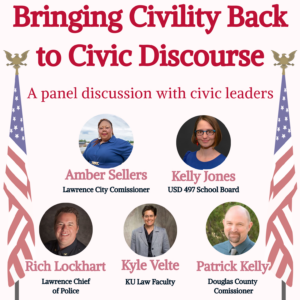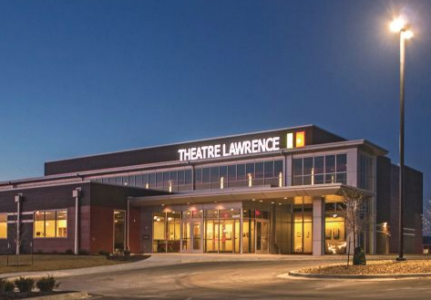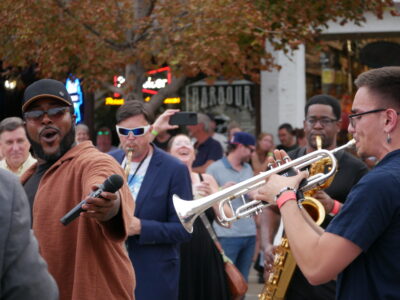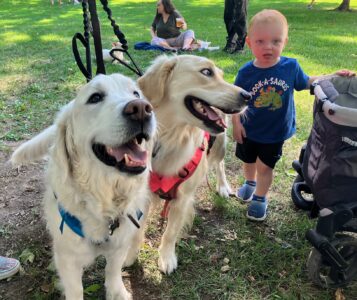Public officials who’ve been targeted by public commenters will be on panel regarding civility and civic discourse

photo by: League of Women Voters
Officials in Lawrence will discuss civility in public discourse at an event Oct. 7 at the Lawrence Public Library.
A panel discussion titled “Bringing Civility Back to Civic Discourse” is scheduled for next month at the Lawrence Public Library and will feature four public officials who’ve been aggressively targeted by public commenters.
The event, sponsored by the League of Women Voters, will be from 6 to 7 p.m. on Oct. 6. It will include Lawrence Police Chief Rich Lockhart, Lawrence City Commissioner Amber Sellers, Lawrence school board past president Kelly Jones, Douglas County Commissioner Patrick Kelly and KU law professor Kyle Velte.
Although the flyer for the event doesn’t mention it, Lockhart, Sellers, Jones and Kelly have all been targeted by public commenters at government meetings who frequently resort to obscene name calling and disruptive behavior, prompting most governing bodies in Lawrence to amend their rules, to move the public commenting period to the end of the meeting and, in some cases, to ban in-person commentary by certain individuals.
The city, school board and county have all been sued multiple times by frequent commenters who claim that their First Amendment speech rights are being violated when they are asked to refrain from obscene and abusive language and personal attacks at government meetings — lawsuits that they have so far lost.
Several commenters have insisted that they can use sexually graphic language at public meetings because the obscene language appears in library books, drawing no distinction between choosing to read a book in private and having to listen to obscene language at government meetings.
They have also asked courts to make no distinction between a government business meeting and a public street corner when it comes to free speech rights, which courts have rejected, holding that reasonable rules of meeting decorum do not violate the First Amendment.
Sellers took a stand against the personal attacks last year by absenting herself for at least two months from the general comment period at City Commission meetings.
Sellers posted a statement to social media in early September 2024 saying that because some members of the public repeatedly engaged in abusive personal attacks and a level of “toxicity” that eroded trust in democratic institutions, she would observe the public comment period remotely.
Jones expressed similar concerns earlier this year and even mentioned the possibility of terminating public comment, at least temporarily, following a 30-minute standoff with a commenter who was refusing to obey board rules, as the Journal-World reported.
Nothing in state law requires that government bodies take public comment, but it is a practice and tradition that public officials generally promote and value.
Last spring, one commenter was arrested on suspicion of “interfering with the conduct of public business” after repeatedly insulting Commissioner Patrick Kelly with sexually graphic language at meetings and arguing with the commission chair.
Another public commenter routinely screams obscenities toward the police chief at city meetings and last summer dressed down Mayor Bart Littlejohn, saying that as a Black man civil rights should be Littlejohn’s “forté” and that he should do more to protect speech rights. The commenter also used the word “colored” to describe Black commissioners and then used the N-word multiple times in berating the mayor, including telling Littlejohn, “I’m not your field (N-word), b-tch.”
The year prior to that, that commenter had been banned for 60 days from attending city meetings. City Manager Craig Owens said two years ago in the letter banning the commenter that the city was committed to maintaining a safe space for important community business to be conducted and for members of the public to participate.
School board member Shannon Kimball told the Journal-World last winter that in her 14 years on the board she had sat through hours and hours of being criticized, often harshly, for this or that decision. She said she respectfully endured that criticism as part of being an elected official, but she had never seen anything like the current atmosphere of public commenting in Lawrence, which she described as bullying and harassing.






